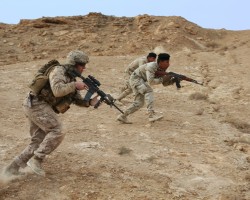
The Costs of Losing Strategic Patience in Syria | J. Dana Stuster
The Costs of Losing Strategic Patience in Syria
By Dana Stuster, Policy Analyst at the National Security Network
November 22, 2014 | Real Clear World
After three years of strategic ambivalence followed by three months of strategic shift, President Barack Obama may be considering another change in strategy for Syria. He’s convening a team to assess the administration’s current plans, CNN reported on Wednesday night. That team may consider accelerating and expanding U.S. assistance to Syrian opposition groups and targeting Assad regime forces.
Consistently reassessing strategy is good policy, and the administration is right to take a hard look at its plans for Iraq and Syria. But immersing the United States deeper into Syria’s civil war was a bad idea three years ago, it was a bad idea in August, and it’s still a bad idea today. America has one vital interest in Syria: preventing the Islamic State from staging a terrorist attack against the United States or its allies. We have no national interest and we lack the political will as a nation to commit to ending the Syrian civil war. Without these elements, we shouldn’t try.
Any effort the United States makes to try to build a Syrian opposition to defeat the regime of Bashar al Assad – or to provide support against regime forces ourselves – will be a half-measure. Intervention advocates know this – their plans range from the politically unviable to the strategically underwhelming. Some suggest training a few thousand Free Syrian Army rebels to fight against the Assad regime (and, we hope, against the Islamic State when it suits their interest). Others have larger plans and have suggested forming a 60,000-strong opposition army of moderate Syrians, with leaders handpicked by a Western coalition. All of the proposed strategies rest on dangerous assumptions about what the United States can actually accomplish. The United States may be the indispensable nation, but that doesn’t make it omnipotent.
To continue reading, click here
Photo credit: Freedom House Flickr, 11/23/12.





